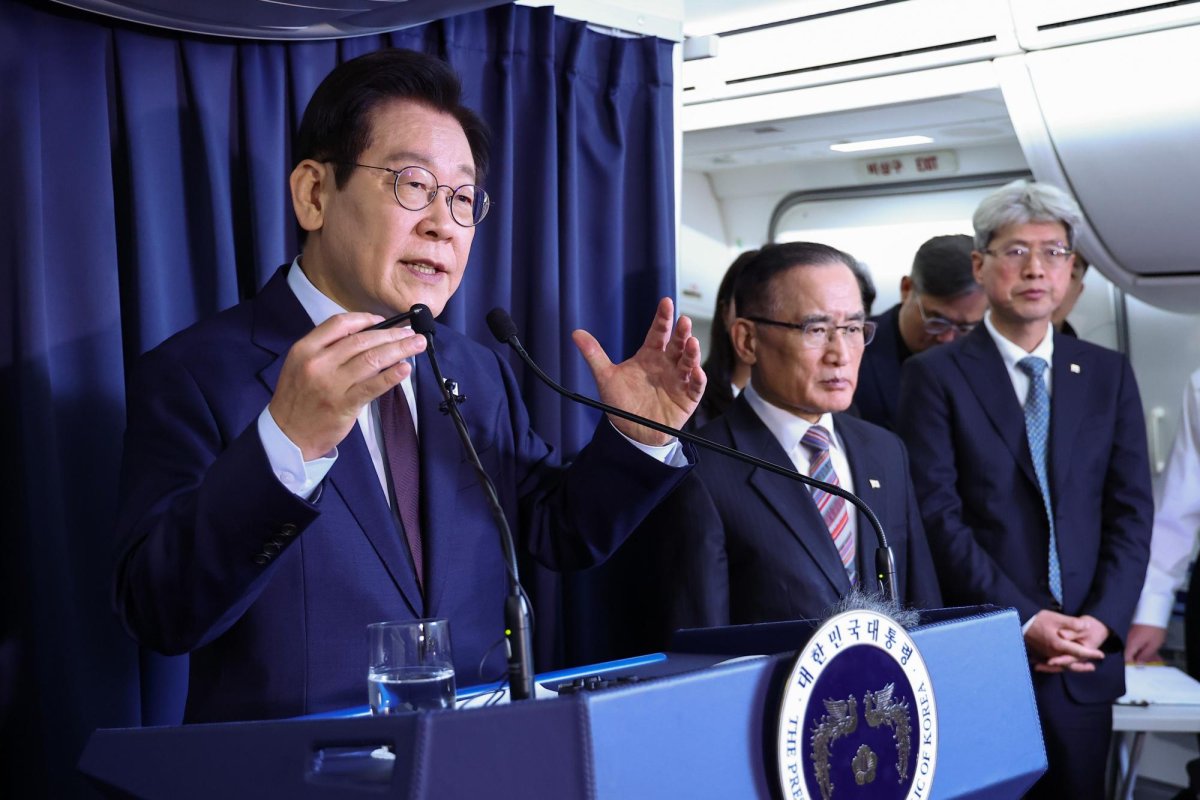South Korean President Lee Jae Myung (L) warned of the risk of accidental clashes with North Korea during a press briefing aboard the presidential flight from Johannesburg, South Africa, to Ankara, Turkey, on Sunday. Photo by Yonhap
President Lee Jae Myung has warned risks of accidental clashes with North Korea, saying Seoul must continue to make efforts with patience to resume dialogue with Pyongyang to reduce such risks.
Lee gave the assessment on inter-Korean relations at a press conference aboard his flight from Johannesburg to Ankara on Sunday (local time), as part of his four-nation trip to Africa and the Middle East.
Inter-Korean relations have turned extremely hostile and confrontational, and North Korea is engaging in very extreme actions without even the most basic level of trust,” Lee told reporters. “We are in a very dangerous situation where accidental clashes could break out at any time.”
He renewed his call for dialogue after Seoul proposed military talks to clarify the Military Demarcation Line (MDL), aimed at preventing unintended clashes near the border. The proposal came amid repeated incidents of North Korean soldiers briefly crossing the MDL while clearing land or laying mines in the buffer zone.
Lee noted that the North has been installing triple layers of barbed wire along the MDL, raising the risk of warning-fire incidents amid differing views on the precise border line.
“With all communication channels severed, even if an accidental clash occurs, there is no way to resolve it,” he said.
To ease tensions on the Korean Peninsula, Lee underscored the need to push for dialogue with Pyongyang even if it remains unresponsive.
While reaffirming unification with North Korea is South Korea’s ultimate goal, Lee said it must be approached from a long-term perspective.
“We have no intention of pursuing unification by absorption,” he said, emphasizing that discussions on unification should come only after dialogue resumes and peaceful coexistence is established.
Asked whether South Korea could consider curtailing its joint military drills with the United States to bring Pyongyang to the negotiating table, Lee said it is premature to draw conclusions, calling the matter “the most sensitive” issue for North Korea.
He said that while a stable peace regime in which large-scale exercises are unnecessary would be desirable in the long term, decisions on drills should depend on evolving circumstances.
“If a stable peace regime is firmly established between the two Koreas, it would be desirable not to conduct the drills,” he said. “Depending on the situation, reducing or postponing the exercises could become either the result of building a peace regime or leverage to help create one. It is difficult to say at this moment which it will be.”
Pyongyang has long denounced the Seoul-Washington exercises as “war rehearsals,” while the allies claim they are defensive in nature.
On relations with China, Lee reiterated that South Korea should stably manage ties with its largest trading partner while advancing the alliance with the U.S. to a strategic comprehensive one encompassing the economy and technology.
“The basic principle of our diplomacy is the Korea-U.S. alliance, while stably managing relations with China,” he said. “The foundation of this approach is pragmatic diplomacy centered on national interests. I have clearly communicated this principle to both the U.S. and China.”
Regarding the diplomatic row between Beijing and Tokyo over Japanese Prime Minister Sanae Takaichi’s recent remarks on Taiwan, Lee called for a “cool-headed approach” guided by national interest.
He said he held separate talks with Takaichi and Chinese Premier Li Qiang on the sidelines of the Group of 20 (G20) summit in South Africa to prevent misunderstandings or conflict.
“I have explained our position in the two meetings,” he said, adding that “there are no additional risk factors” in South Korea’s relations with the neighboring nations.
South Korea, China and Japan reportedly had consultations to arrange their first trilateral summit since May 2024. But the outlook for trilateral engagement remains cloudy amid a diplomatic row between Tokyo and Beijing.
Lee said leaders he met on the sidelines of the G20 summit in South Africa and visits to the United Arab Emirates (UAE) and Egypt showed strong interest in South Korea’s defense industry.
“In particular, they were interested in joint development, production, sales and exploring new markets,” he said.
He expressed optimism in clinching a major defense deal from the UAE following his summit with President Mohamed bin Zayed Al Nahyan last week.
Lee also said Egyptian President Abdel Fattah El-Sisi outlined plans to expand Cairo International Airport under an estimated cost of around 3-4 trillion won (US$2-2.7 billion), while expressing hope that Korean companies would join the project to overhaul and operate it.
In Johannesburg, Indian Prime Minister Narendra Modi proposed establishing a cooperative framework in the shipbuilding industry involving South Korea, Japan and India, Lee added.
Ahead of his summit with Turkish President Recep Tayyip Erdogan on Monday, Lee said he wants to highlight Korea’s advanced nuclear energy capability to promote the state-run Korea Electric Power Corp. (KEPCO)’s bid to win a new nuclear plant project in Turkey.
In 2023, KEPCO submitted a preliminary bid to Turkey’s project to build its second nuclear power plant in Sinop on the Black Sea coast.
Copyright (c) Yonhap News Agency prohibits its content from being redistributed or reprinted without consent, and forbids the content from being learned and used by artificial intelligence systems.
